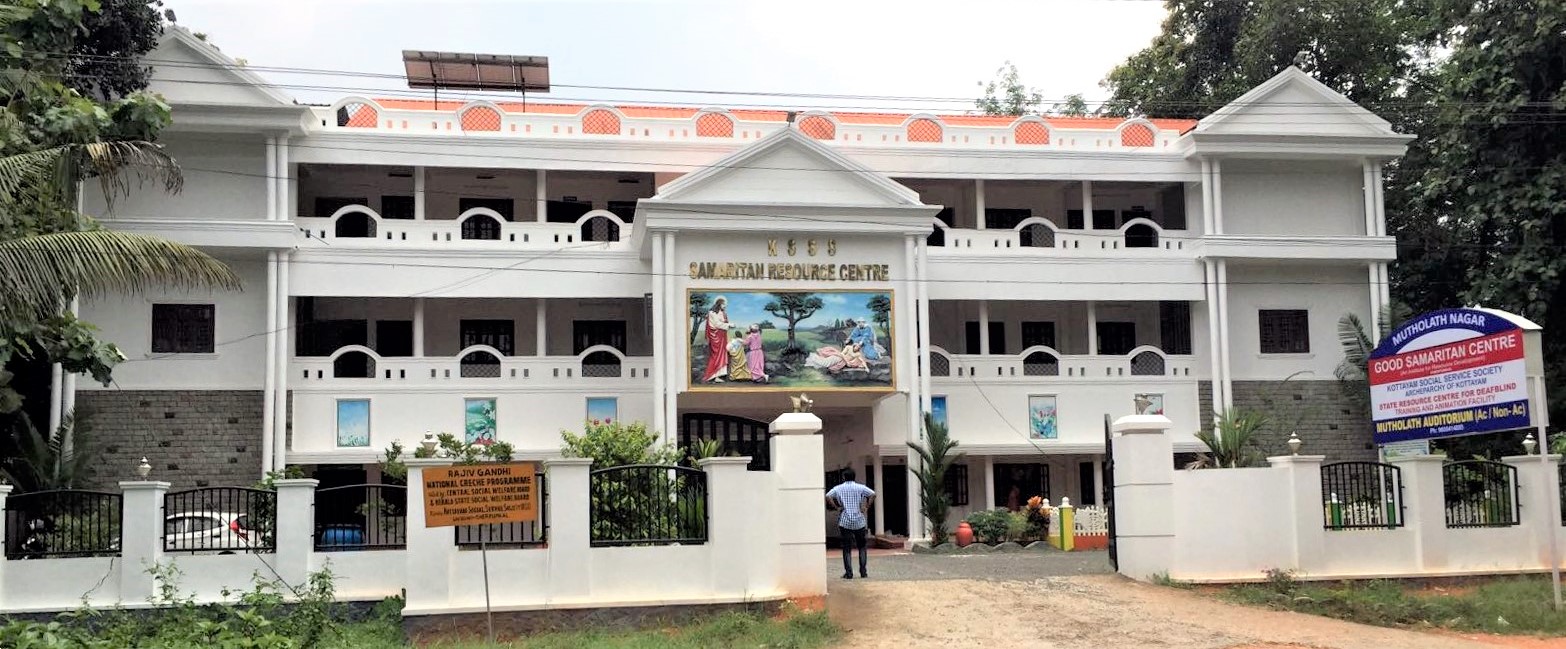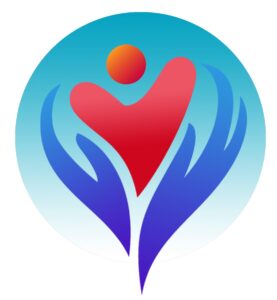

The Good Samaritan Resource Centre is dedicated to the promotion of ability development. It functions as the Learning Center at the State level for the recovery of individuals with Deafblind disabilities. The objective of its services is to promote the comprehensive growth of disabled individuals, thereby enabling them to live a dignified life in society.
The state of Kerala has a scarcity of institutions that provide care and training to children who have been affected by blindness and deafness from birth or later. The Good Samaritan Centre at Mutholathu Nagar, Cherpunkal, is working towards bridging that gap. Our center offers timely evaluation, treatment, and training that can prevent or minimize deficiencies in children. This brings comfort to many children, young adults, deaf-blind individuals, and their families. The institution provides transportation services to bring deaf-blind children and their guardians for treatment and training. They are conveyed to their respective residences during the evening.
In addition, this institution conducts vocational training, camps, and seminars for young people. The “Deen Dayal Upadhyaya – Grameen Kaushala Yojana” initiative, backed by the Government of India, has been operational at Good Samaritan since June 2018. The project provides job training and placement for individuals between the ages of 18 and 35. The Good Samaritan Centre accommodates young women from different districts, whereas Agape Bhavan houses young men. The training they receive on modern subjects enhances their chances of finding employment.
HISTORY
Fr. Abraham Mutholath made a donation of 1.69 acres of land on the roadside of Pala-Ettumanoor Highway at Cherpunkal to Kottayam Social Service Society (KSSS) as a tribute to his parents M.C. Chacko and Achamma Mutholath. KSSS built the Good Samaritan Resource and Training Centre for which Fr Mutholath donated two crore rupees from his earnings.
Mar Jacob Angadiath, Bishop of the Syro-Malabar Diocese of Chicago, laid foundation stone for the building on 15th August 2010. Archbishop Mar Mathew Moolakkatt presided over the meeting. After completing the building construction, Mar Mathew Moolakkatt blessed the building on 21st August 2011. Minister K.M. Mani inaugurated the building. The program for the deaf-blind children was started with the support of Sense International, India with backing from DFID–Global Poverty Action Fund.
KOTTAYAM SOCIAL SERVICE SOCIETY (KSSS)
The KSSS is a registered non-profit organization of the Catholic Archdiocese of Kottayam established in 1964 to organize social service activities in the operational areas of the diocese regardless of caste and creed. Its primary target group comprises people below the poverty line, especially those in the marginalized sections such as women, farmers, widows, and disabled. The society aims to empower individuals for development, with the ultimate goal of achieving social transformation that leads to a just society.
COMMUNITY-BASED REHABILITATION FOR DEAFBLINDNESS
Kottayam Social Service Society is a pioneer in the Community-Based Rehabilitation for Persons with disability in Kerala. For the last 25 years, CBR programme of KSSS has been working in five districts in Kerala. As part of expanding CBR programme, KSSS started Community Based Rehabilitation Programme for Deafblind People, as a new endeavor with the support of Sense International India and DFID, UK in the year 2011.
Deafblindness is an unparalleled disability that encompasses both auditory and visual deficiencies, leading to intricate challenges with communication, knowledge acquisition, and mobility. In addition, the social stigma relating to disability and poverty further ostracizes children, causing them to become dependent and isolated.
A Community-Based Rehabilitation (CBR) strategy is essential for achieving equal opportunities and social integration of individuals with deafblindness. CBR employs a diverse set of techniques to address the challenges encountered by individuals with deafblindness. The program involves the rehabilitation of the individual within their own family and community, through the cooperation of the community members and the utilization of resources within and outside the community. Our organization is committed to equipping deafblind individuals with the education and skills required to live autonomously and utilize their abilities to become productive members of their family and community.
Kottayam Social Service Society, which functions as a State-level Learning Centre for deaf-blindness, with the support of Sense International (India), works towards developing services for deafblind people all over Kerala. KSSS gives technical support to other organizations working in single disability for initiating services in deafblindness. Our Regional Learning Centre’s primary goal with respect to deaf-blind individuals is to foster an inclusive environment in society and to ensure their quality of life.

SERVICES OF GOOD SAMARITAN RESOURCE CENTRE
COMPONENTS OF CBR DEAFBLIINDNESS PROGRAMME
– Sensitization Programme: Due to lack of proper awareness and superstitious beliefs, deaf-blind individuals are often marginalized from mainstream society. The success of this program relies heavily on the participation of both family and community. Community awareness is necessary to enable community participation. It will contribute to a shift in the community’s attitude.
– Early Assessment Programme: KSSS conducts Assessment Camps regularly as part of the project to identify individuals who are deaf-blind, with the assistance of ophthalmologists and audiologists. Additionally, we organize reassessment camps to determine the current status and level of improvement of the individuals.
– Early Intervention Services: Our organization collaborates with hospitals to provide Early Screening and Intervention Services, such as at Caritas Hospital in Thellakom where we facilitate screening of newborns using an Oto Acoustic Emission machine (O.A.E). Our organization collaborates with hospitals and ICDS to ensure the timely detection of infirmities and disabilities.
– Home Based training: In addition to the center-based training, KSSS offers home-based training to Deaf-blind children through trained field workers and special educators in the presence of their family members.
– Home Based Vocational Training Programme: To promote self-reliance and home-based independence for the deaf-blind, vocational training is provided to children aged 10 and above, supported by their parents. Examples of such activities may include mat making, paper-bag making, handicraft making, and broom-making.
– Inclusive Education: To ensure the integration of Deaf-blind children with their non-disabled peers, KSSS advocates for inclusive education in village schools under SSA. Deafblind children who are self-sufficient are integrated into mainstream schools and receive specialized training in designated classes.
– Regular Medical camp: A regular medical camp is an essential part of the program. KSSS organizes quarterly medical camps that offer services from a neurologist, physiotherapist, and speech therapist. Regular medical support is provided to deaf-blind children to assess their progress and determine the next steps for intervention.
– Surgery and Assistive Devices: The program provides surgical costs and assistive devices such as Hearing Aids, CP Chair, Caliper Shoe, Spectacles, and Physiotherapy equipment to those who are in need.
– Self-Help Groups: The inclusion of Deaf-blind individuals in CBR SHGs is an essential component of the Rehabilitation Programme. Through SHGs, they work together to address problems and develop solutions as a team. The individuals deposit their savings into the SHGs and receive credit to fulfill their requirements.
– Case Review Committee (CRC): The project team has formulated a Case Review Committee to scrutinize activities and ensure impeccable implementation of the program at the grassroots level. The Committee includes a project implementation team and experts. It meets every Wednesday and evaluates the activities of the past days and works out action plans for the coming days. The weekly CRC helps workers to share their problems faced, and the team finds solutions.
– Income Generation Programmes: Full rehabilitation will only be achieved when the deafblind individual can lead an independent life as an earning member of society. KSSS provides facilitation for Income Generation programs to individuals with deaf-blindness, with the help of their family members, to help them attain self-reliance.
– Counseling Services: Center-based and Barefoot Counseling services are offered to individuals with deaf-blindness and their family members as a means of enhancing their rehabilitation.
– Parents’ Network Programme: The participation of parents is of utmost importance in the rehabilitation process of individuals with deaf-blindness. Therefore, a vigorous and animated Parents Network has been developed, and they convene a monthly meeting.
– Exposure visits: Every year, deafblind people are taken to various places for exposure, as it helps with mental relaxation, social interaction, and education.
– Immunization: Continuous dissemination of awareness is provided to motivate individuals to ensure immunization for their children under the age of five. House visits and awareness initiatives by SHGs help individuals understand the necessity and significance of vaccination.
– Mother and Child Health programmes: The program provides education on care and precaution during pregnancy to all women. Mothers understand the milestones that children must reach and the precautions to minimize the chances of deaf-blindness.
– Advocacy & Lobbying: Annual State Level Advocacy meetings are held to strategize new policies and advocate for the rights of Deafblind individuals. Representatives from the disability sector, social workers, and government officials take part in the meetings.
| VISION | MISSION |
|---|---|
| A future where deafblind people are not limited by their disability, but are instead empowered to achieve their full potential. | To create a society where deafblind people are understood and respected, and where they have equal opportunities to participate fully in all aspects of life. |